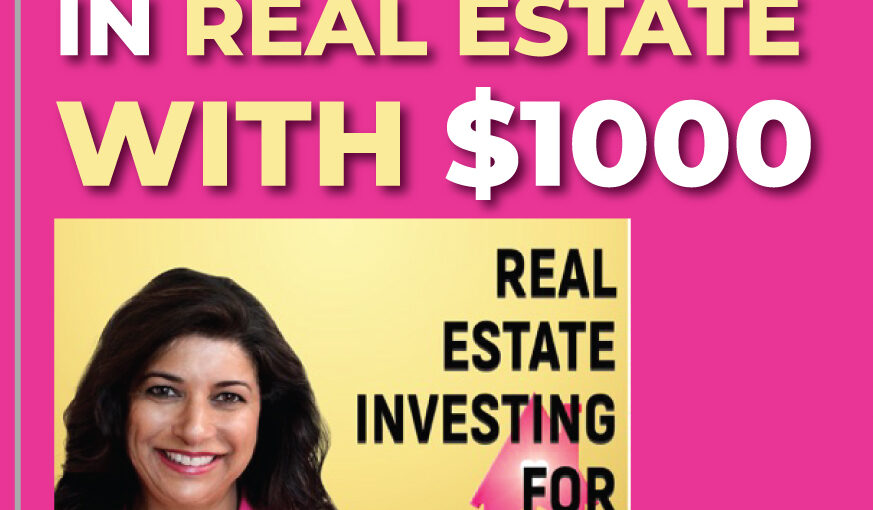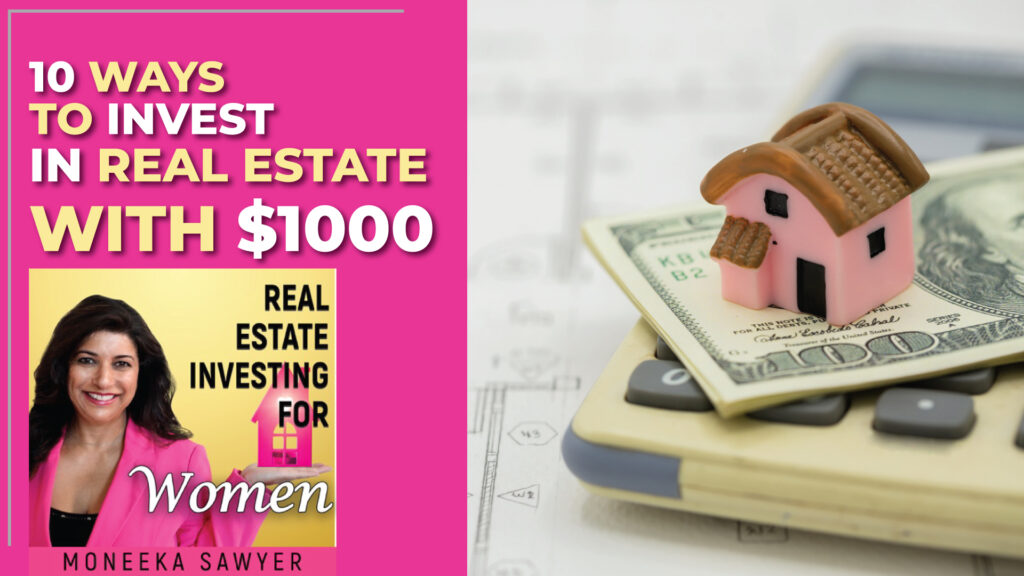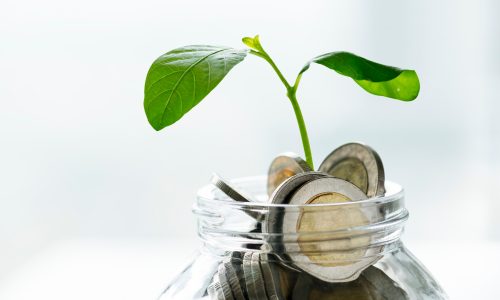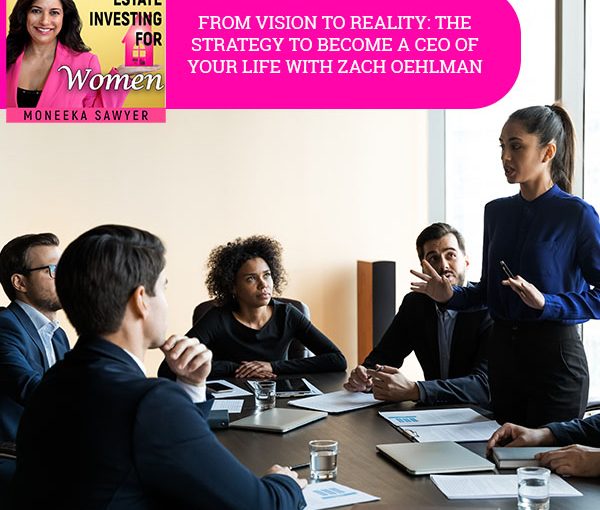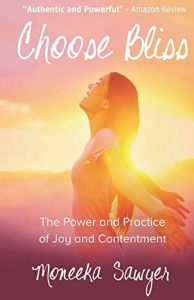10 Ways to Invest in Real Estate for Under $1000
Moneeka Sawyer is often described as one of the most blissful people you will ever meet. She has been investing in Real Estate for over 20 years, so has been through all the different cycles of the market. Still, she has turned $10,000 into over $5,000,000, working only 5-10 hours per MONTH with very little stress.
While building her multi-million dollar business, she has traveled to over 55 countries, dances every single day, supports causes that are important to her, and spends lots of time with her husband of over 20 years.
She is the international best-selling author of the multiple award-winning books “Choose Bliss: The Power and Practice of Joy and Contentment” and “Real Estate Investing for Women: Expert Conversations to Increase Wealth and Happiness the Blissful Way.”
Moneeka has been featured on stages including Carnegie Hall and Nasdaq, radio, podcasts such as Achieve Your Goals with Hal Elrod, and TV stations including ABC, CBS, FOX, and the CW, impacting over 150 million people.
From Vision To Reality: The Strategy To Become A CEO Of Your Life With Zach Oehlman – Real Estate For Women
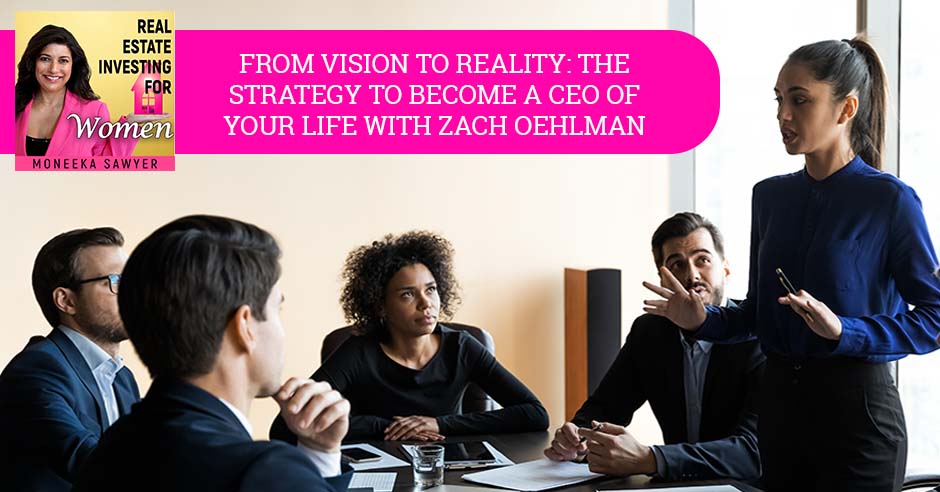
We always want to find bliss, but we have no control over the things around us. How do we do that? How can we control our lives despite the busy day-to-day of business? In this episode, Zach Oehlman, the founder of Valley Investment Club, shares his insights on developing yourself through a Vision To Reality strategy. Zach dives deep into personal development and personal responsibility, particularly in his real estate business. He tells us that when we are changing our life, we must change the context first. When life sucks, we don’t blame life; instead, we must be responsible for how to deal with it and empower ourselves in the process. To find the world of bliss and become the CEO of our lives, tune in to this episode.
—
Watch the episode here
Listen to the podcast here
From Vision To Reality: The Strategy To Become A CEO Of Your Life With Zach Oehlman – Real Estate For Women
Real Estate Investing For Women
I am excited to have you on the show, Zach Oehlman. This is what Zach has to say about himself, “I grew up in a small town in Northwest Indiana and went on to college at Indiana University for Finance and Business. I started a career as an evaluation consultant and became a published author in this industry before starting my own business.
I have spent several years growing multiple businesses and traveling the world with my wife. We own and operate three businesses, a real estate investing community, a software and automation company, and a VA business development company. We find great people with great companies and help them scale themselves out of the day-to-day business.” Zach, welcome to the show. How are you doing?
Blessed and highly favored.
I’m excited to be talking to you. I don’t know if you know this about me, but I personally have traveled to 65 countries. Travel is my deepest passion. Here’s one of the things that happened over the last few years. We know what happened during the pandemic, and that was a different reason, but since I started this show and this business, I haven’t been able to travel. The business has owned me.
You and I were talking about in the green room that it’s time for me to get back to the blissful life that I created. I want to get back to that. I love doing this show. I love serving my ladies, but it’s time for me to pay a little bit of attention to my needs too. I’m excited to be talking to you who’s doing that thing. You’re traveling the world and running businesses remotely, and it’s not taking a huge amount of your time. I’m excited to be talking to you about it. Could you tell us a little bit about your story and how this all started?
Way back when, in the little town of Kouts, Indiana, I’m a farm kid. I didn’t value anything other than being outside. My dad died when I was twelve. I took over the family farm before and after school, but I always had this deep desire to travel the world, help people and make a lot of money. I didn’t know how to do it. I started looking into this world that I wanted to get into. What I found was it takes money. I listened to some of your stuff. It’s like, “Money creates choice.” I love the way you say that. I was like, “I want to learn how to make all the money in the world so I could do whatever I want.”
They said, “Become a business owner or an investor.” Fast forward, I went to college. I took college very seriously. I graduated, from IU with a degree in Finance and Business in 2008. If anyone remembers 2008, that is not a great time to be in the finance market. I sent out 3,500-plus resumes over 3 years. I worked down at the Chicago Board of Trade.
I became a consultant in the valuation industry, six figures a year, every bell and whistle you could think of. I was like, “I made it. Here it is,” and I was miserable. I pulled the curtain out. I got to see the underbelly of this, and I was like, “This is going to be the rest of my life, 60 to 100 hours a week, 2 weeks a year, and high stress. A big error could cost millions of dollars and someone’s going to replace you with that. This isn’t what I wanted.”
A friend invited me down to a meeting and say, “Why don’t you come and check this thing out called real estate?” I was like, “I wanted to do it.” I sat through a presentation. I was super interested. I join their community. I got to work. It took me about eighteen months to do my first deal. I didn’t have any money. I had to borrow the money to get into the training and development program for my mom and I’m thankful for her.
I knew that this was the solution because I tried everything else then I was able to quit my job. We started our own real estate investing community because one of the things I’ve learned is you are a product of the people you hang around. I’m like, “I need to bring the resources to me instead of going and getting them.”
Fast forward, we’ve created a nationwide community of over 1,000 people that are connected to 32,000-plus people. In developing that, there are needs. People need access to capital, software, and all these ancillary services. I wanted to make sure that they were well taken care of, so for some of the more business development companies, I created that because I needed it.
I was paying big bucks to all these consulting firms and third-party people. They weren’t in alignment with the other people. I brought all in-house, learned how to scale businesses, learn how to document the process, and then learn how to put people in that. My big vision was to travel the world, then I had this great opportunity called COVID because I ran an in-person meeting twice a week, with 2 to 300 investors every Wednesday and 100 to 150 investors every Saturday. We had training. We moved all of that online. We had this beautiful apartment in Downtown Phoenix on the twentieth floor we just moved into. We were excited about the nightlife and restaurants, and we were in there for a week, and everything got shut down.
I was like, “What are we going to do?” After about four months of doing Zooms every day, I looked at my wife and said, “We don’t even have to be here.” We went to Hawaii for two months, tested that out, loved it, and didn’t like the time change. We came back. We got some things in order, then we went on a two-year world travel like in Columbia and a bunch of different countries. We go and stay for 2 to 3 months. We work during the week, set up our office, and then on the weekends, we enjoy the fruits of labor. It’s trial and error. Eventually, we figured it out.
What I’d love to share with the people is how we did that because it’s different for everybody. It’s a simplistic process if you’ve been through it. If you haven’t been through it, it’s wild. We ended up making it happen. We came back to the United States. We bought another house. We’re getting that up and ready for our personal flavor, then we’re going to short-term rent that out and head to Asia.
People need to understand what it takes to get started in a business. Could you give us your perspective on that?
There are a couple of perspectives on getting started in a business. I’m an analyst by trade. I used to be the most socially awkward person you could ever see. I would break out in sweats, stutter, and stammer. My mind would go blank. I was not a people person. It still takes something for me to get in front of people. I have to call it forth and be intentional about it. What I’ve learned is there are a lot of people that want to go into business, and they don’t even understand what that means like, “I want to start a business. I want to quit my job.” Even the phrase, “I want to be a real estate investor,” what does that mean? There’s such a simplistic to complex conversation around that.
What I tell the people starting off in business is to go find a great product or service that someone else is already created and then sell it. That is such an entry-level, low-risk, learning time of your life because you don’t have to worry about fulfillment, product creation, and all of that stuff that goes with running and managing a business. There are a lot of moving parts to this. What I tell people is, “Go find something great and learn how to sell it.” Once you make some money and understand the processes of business, selling, and making money, then you can start replacing yourself and moving into that. I tried to move to owning and running a business way too quickly, and I didn’t understand all the other variables of it.

Vision To Reality Strategy: Go find something great and learn how to sell it. Once you make some money and understand the process of business, selling, and making money, you can start replacing yourself and moving into that.
In the context of real estate, what I would tell people is you could do real estate with none of your own money and none of your own credit. It’s very true. Here’s one of the easiest things for people to do. I neglected to do this. I was a high six-figure earner, great credit, and I didn’t use it. I was focused on getting these crazy discounted properties and doing it with none of my own money or credit that I neglected doing the simple thing called, “Go get pre-approved. What can I find off the MLS that cashflows?”
I want to highlight that. Even in reading this blog, a piece of me sometimes feels like I want to apologize to my ladies because there are many cool ideas and things that people bring to this show, and it’s cool to read. It can be a little bit confusing, especially when you’re starting because when you’re starting, you want to start the business with the least moving parts and complications. That is what will get you moving. You want your first steps to be the easy ones to feel good because once you have success, then you have more confidence to do the next step. You’re more willing to work harder too.
First of all, they get confused by all the options. When they finally jump in there, it’s hard that they burn out within the first couple of years and they can’t do the long-term, which in real estate, the money is in the long-term. Dealing with the simplest path, which is getting regular credit and buying something on the MLS, I recommend you make sure it’s your first home because you can put the least amount down.
The loans are the easiest to qualify for. You can get the most money. It’s the lowest rate. All of those things are in your personal resonance. If you want to cashflow it, now you can house hack. Rent out a room, Airbnb, and all of those things. I’ve done it all in my primary resonance because it’s the easiest way to get started, and then, “We did this. What can I do next?” Now there’s room for expansion and learning. It’s fun because you’ve already had success.
At that simplistic level of MLS and using your credit and a realtor, you got the realtor and broker or the finance person guiding you. In this world of real estate investing, it’s fast-paced money and high-risk rehabs. I know you own your own construction company. Rehabbing? Understanding that skillset is a big journey. If you take the opportunity cost of high-interest money and timeline to rehab stuff, they’re probably better off getting out of the gate and buying straight off the MLS.
In the very beginning, you’ve got pros that you get to take advantage of them. You’re getting into the business in the most intuitive way like the way that we all understand. The other thing that’s also interesting about that is you’re getting into the business in a way that your community will support you. You’re not going to hear all the fear factor of everybody saying, “That’s hard. That’s risky.”
People might be saying now because we are afraid of a recession and interest rates have gone up. In general, people understand that it’s a good idea to own a house. Until you’ve built a community of other real estate investors that understand where you’re headed, you’re not going to be dealing with the naysayers in general when you start in this way, which is super helpful not to have to fight that.
I did tell anybody for one year and a half I was doing this because I didn’t have the confidence. I was a six-figure earner college degree. I had the proverbial dream life. Everyone is like, “Why are you wanting to quit that?” I didn’t even tell anybody because I didn’t have the confidence to deal with the naysayers.
You don’t want them pulling you down. This topic is deep and close to my heart. Can you talk about personal development and personal responsibility with regard to your business in real estate?
I’m an analytical guy. I understand discount rate cap rates. I’m a published author in finance. I’m like, “I’m going to make so much money. This is going to be great,” then nothing was happening. I was focused on the tactical and practical side of it. I can do spreadsheets. I’m the numbers guy, but in my bank account, it wasn’t happening. My mentors and the people I hang around are like, “We have a personal development guy coming in this weekend. You need to be at this training.” In my mind, I was like, “What is that? What’s personal development?” It wasn’t even in my vocabulary.
I remember I came to this training and cried for six hours. I was in the front row. It was the first time in my life that I was like, “Here is the door to this room I’ve been trapped in. It’s called personal development.” I signed up for his program. I got his coaching. I went straight to the library and was like, “Do you have any books on personal development?” They looked at me funny and go, “Yes, that whole section over there.” It’s like this whole world that I uncovered.
I’ve never been talked to like this. On one of my first coaching calls, he was very respectful, but I was paying for a guy to help me get through something that I didn’t know what it was. He laid it out like this, and I’m going to paraphrase, “Quit blaming everyone else for your lack of success. You’re at where you’re at because of you, and no one else. Take responsibility for that. Own it. Let’s move forward.” He had a couple more choice words in there. I remember where I was. I was angry. I was like, “I didn’t want to hear that.”
Quit blaming everyone else for your lack of success. You're at where you're at because of you, and no one else. Take responsibility for that. Own it. Let's move forward. Share on XIt was like, “What do you mean that’s my fault.” Five minutes later, I had this breakthrough. I was like, “If it’s my fault, that means I could do something about it. Personal responsibility. I’m responsible. I don’t have to wait for the raises or for someone to offer me deals. I can go out there and hunt instead of waiting for things.” Over time, this concept of personal development and responsibility, anytime something isn’t going right or isn’t going the way I want in my life, I go, “How am I responsible?” and then I can do something about it. I’m constantly in programs. I have coaches that don’t coach me around real estate. It’s all personal development, and there are many different flavors of it.
I wrote a book called Choose Bliss. I talk about the flavor of bliss with regard to everything that I teach. Here’s one of the things that I say over and over again, and people have heard me say it so much that they don’t even hear me say it anymore, “We can’t control what happens outside of us, but we must control what happens inside of us because that’s all we can control.” It’s all we have true access to.
I can see where you’re coming from, and I’ve come from this same place. We’ve got this amazing education. It’s, “You can’t tell me it’s my fault. Do you know who I am? Do you know how smart I am?” I didn’t say how smart I am, but we could. We’ve got these college educations and all of this stuff. The reality is, “Do I know who I am? If I don’t take responsibility for who I am, it doesn’t matter what anybody else thinks, says or what education I’ve got because that education doesn’t mean anything unless I am utilizing it for what I want in my life.” In my book, I have a whole chapter about 100% responsibility.
If people took personal responsibility, we would have a different world.
If people took personal responsibility, we would have a different world. Share on XYou’re not blaming people politically, the recession, your boss, your children, or your spouse. You’re taking responsibility for how you’re responding to these situations. From that book, that is the chapter that makes people the most upset. I get emails on this all the time. For instance, I’ve had horrible things happen to me, “Are you responsible for what that guy did to you?” “I’m not responsible for what that guy did to me, but I am responsible for how I choose to respond and how I choose to have relationships and live my life afterward.”
I have coaching calls with my coach. She’s like, “How are you responsible for something?” I was like, “I’m not even privy to the relationship.” She goes, “I know, but if you find a way to be responsible, then you can do something.”
People think that because you’re responsible, it’s your fault, but because you’re responsible, you can affect change. It’s empowering. It’s not depowering. Thank you for bringing that to the table. Could you talk a little bit about knowing where you’re going and who’s coming with you?
This is an evolving conversation. A lot of the training I do is from life experience. I run as fast and hard as I can. I go through the roadblocks and the challenges, and then I’m like, “What did I learn from it?” We share that with the people following us. I remember when I first started our real estate investing community. It was like, “I’ll take anybody. I need some help.”
Everybody is welcome. As we have grown and developed our personal lives and businesses, the more money we make, the more intentional we have to be, and the more we have to select who we’ve spent our time with. We have to make sure that those people’s ethics, principles, and the way they conduct themselves align with the overall mission and vision of where we’re going.
First off, if you don’t know where you’re going, we always hear that you’ll float around. The other aspect, and I’m learning this as we scale where I put people in my place, is I don’t train on the practical and tactical stuff as much as I do the principles because I want them to be trained in sound principles so that they can attack anything that comes their way, which means they don’t need me because they can do the critical thinking. One of the things I see a lot of the time is people coming in, and maybe for you or me, this is hard to fathom, but people don’t have a vision.
I’ve learned this over the years. I’ve been doing this for many years. We’ve helped thousands of people. We’ve created this process called Vision To Reality. We help people in their businesses and get started in real estate. When I ask them, “Where do you see yourself in 5, 10, or 15 years?” I’ve had people break down and cry. They’re like, “No one has ever asked me that question. I’ve never put any time into it. I don’t even know.”
What’s critical is knowing where you’re going. I didn’t understand that. I just wanted to learn the tactical and practical. I hear people, “I want to make $5,000 a month so I can quit my job.” Some are, “I want to make $10,000.” My question to them is, “What is that money paying for? If it’s a dollar value, you will lose motivation.”
What I recommend people do is create a vision. We do it through vision boards. We have training and development programs for it, but it’s as simple as a vision board. For me, it was to travel the world, help people and make a lot of money. That’s been that for eighteen years. I constantly bring that down to more of a reality. One of our ways to give back is I want to create a content creation studio in every country. That’s why my list. I want to have a house in all the countries that we love to visit because we travel. I break it down into that.
I put a timeline to it. What that does is that help us manage the day-to-day because we can get stuck in the day-to-day of being busy with zero intention. We waste so much time being unintentional, yet at the same time, we need to make sure all of our activities are in alignment with the grand vision. Too many times, I see people say, “I have this vision. I’m doing this.” The first two are taking you backward, and then you should put all your attention on the third one because that’s what’s going to get you there the quickest.
If they’ve never laid that out, they’re going to be busy being busy. I get stuck in that. I revert back to my plan, “What does the plan say? It has nothing in there about this. I’m going to take that out and I’m only going to focus on what my plan is.” I found that to be such a critical component of our success because I’m a person that wants to do everything. I mean everything to the detriment of my bank account and having success in one thing. I’ve taken the task to be an expert at 1 or 2 things and stay committed to it.
You are doing the things that you love to do, and that is the best use of your time and your energy. They’re the things that you’re passionate about and good at, but then you’re going to have other people that do these other things. You’ve built a business around your rock stars. Talk to us a little bit about that.
Hiring people is such a critical component. I’ve hired bad people and I’m still cleaning up the messes. We’ve all been there. I believe in people, in the human spirit, and that anyone can accomplish anything. The challenge is sometimes I believe it more than they do. There are these many different phrases like hire slow and fire fast, whatever.
One of the key components I found about hiring people is if you do not have documented systems and processes, they’re going to do whatever they see fit. You can’t blame them for it because you didn’t show them what to do. If you want to transition from this world of self-production and self-employment to this world of a business owner or CEO, you have to understand and document every process from how you check the mail and do your bookkeeping.

Vision To Reality Strategy: If you want to transition from this world of self-production and self-employment to this world of a business owner or CEO, you have to understand and document every process.
How do you handle emails that come in? All of this little stuff that we do without thinking, when you’re moving somebody in, they have to be able to replicate your thinking. The better you have this process documented with training, the cheaper you can get somebody to fill that. Almost all of our team are overseas. We have people in the Philippines, multiple different countries, South America, Africa, Bangladesh, and the Netherlands. We have people all over the world. My competitive advantage is I have bulletproof systems and processes that I put my team in then those people that I’m looking for to fill that need, I have to make sure that their attitude fits who I am.
This is key. I do a Vision To Reality strategy session with them. I was like, “What do you want out of life? What do you see your next 3 to 5 years being? What is your vision for whatever you want?” I then tie that vision of theirs to the position, and how they make the money. The better they do in that position, the more money they’re going to make to help fuel their dream so they’re no longer coming to work. They’re going to work on their vision and their plan to accomplish whatever it is they want. I’ve tied myself as the source of them getting fulfilled on their vision.
That’s how rock stars work. They are bigger than just the task. You’ll notice that anybody that’s good at what they do never say things that people use frequently, “That’s above my pay grade.” Entrepreneurs will say that jokingly. When you hear it, you’re like, “Oh.” It’s not about boundaries. It’s about their attitude about what they’re doing in their world. Many people will be like, “I need to set strong boundaries because,” and you’re right, you do, but you should not have boundaries on your dream. You can have boundaries on how much time you put in and all of those things. That’s healthy, but you don’t want to put boundaries on your capacity to work and be a rockstar and achieve your dreams.
What I tell people is we have an attitude of, “I don’t know. I’ll figure it out,” even my wife. My wife is a COO. Her background is social work. She was a Director for the Ricky Martin Organization down in Puerto Rico. She is an expert at that, not an expert at finance, real estate, and business ownership, but she has the attitude that she could figure it out. She goes on there and does it. Everyone on my team has the attitude to figure it out. They come to me and go, “I want to make more money.” I was like, “Let’s figure it out. What do you want to do? What lights you up?”
They are like, “I want to try copywriting.” “Let’s put you in a copywriting position and slow roll you into that. See if you like it and if you’re good at it.” We have people who are like, “Let’s move you up into managing a sales team.” They get to come to me and I create that safe space that, “You can make as much money as you want in my business. If you’re great, I’ll find a way to help you get what you want.”
Talk to me about changing your life by changing your context. This is something that you do for the people that work for you and yourself.
Change your life by changing your context. Share on XFirst off, what does context mean? This is the world that I live in. If you’re reading this, I want you to imagine me sitting here with my hand holding up in the context of human body parts, a finger. In the context of body parts, this is a finger. In the context of numbers, it is one. In the context of direction, it is up. It’s like, “To the conversation you’re telling yourself, what is the context?” Instead of saying, “Life sucks, all of this stuff happens to me,” change the context to like, “Look at all these problems I get to solve to become a better person.” In the context of business, “Everybody has a problem.” I use words like disempowering conversation. Is the context you have about your life disempowering you? Mine used to be. Now, I have an empowering context in an empowering conversation.
I have many different contexts for different parts of my life, but one of the things that I want people that are around me to understand is I’m here to empower people to have amazing life. That is everything I focus on. It’s not just around your finances because I know a lot of people have great finances but their marriage sucks or they’re not getting fulfilled.
One of my biggest things was travel. I used to say, “I’m going to have to work 50 years even as an entrepreneur, business owner, or whatever, fill that in, then one day I’m going to get the travel.” My coach said, “Let’s create a context of you can have it all.” I was like, “I could. Couldn’t I?” What’s that founding storyline you guys tell yourself? One of them is, “You can have it all. You can travel, run businesses, and have epic motorcycle adventures, which I love. I love doing all this adventure stuff and I love running businesses. I love making money and helping people do it.” I’ve created the context if I can have it all.
One of the things that you said but led to somewhere else is you started with, “I have different contexts in different areas of my life,” but then you move to the overriding context of, “I can have it all.” Part of what creates bliss in our lives is to have that overriding context. It’s like the culture of your life.
For me, the overriding context or the culture of my life is blissfulness. Everything that I do needs to feel blissful to me, whether it’s my relationships, working out, building my business, doing this show, coaching, construction, or whatever it is. To any of those things, the overriding context is, “Does this support bliss in my life? If not, how can it?” The, “I can have it all,” is an overriding context, but then you take that into the different areas of life and you create a context that will make that area successful based on the overriding context.
That’s the bowl that all the other ones fit in.
This is a great segue into changing because into being at cause. Talk to me a little bit about that. I love this because the cause concept already said it that way. I want you to share that with my ladies because it’s valuable.
All I do is talk to people. I’m getting training development. I ask people like, “What do you want in life?” They start sharing with me, “I want to travel the world. I want to do this, but I can’t because.” Anything after the because is fear. We call it a tear barrier. If you want that thing you’re saying, “I dreamed of traveling the world since I was eighteen, but I couldn’t because I had a job, I didn’t have the money, and the world is scary.”
I wanted to travel, and people are like, “Don’t go there. They don’t like Americans.” We let people lead us. There are all of these becauses. What I’ve learned in the world of personal development was if you want it, you can have it. Transform because to two separate words, be and cause in your life. If you want something, you say, “How can I get this?” It’s the questions that we ask ourselves. You will get an answer.

Vision To Reality Strategy: If you want it, you can have it.
“How do I travel the world?” My answer was, “We got to get out of this job.” Entrepreneurship and real estate investing showed up. We became great at that, but I became successful at it, so I have to be here now. I’ve worked myself back into this thing I’m trying to get out of. COVID came. We moved everything online, “How can I travel the world?” “We’re online, let’s go for it.” Start asking yourself, “How can I?” instead of immediately cutting it off with a statement.
Immediately cutting it off with a statement can be valuable, too, because that shines a light on what it is that is deep inside that makes you feel like you can’t do stuff. You understand your obstacle right at the very beginning. If you have a because, for me, it’s because I feel like I need to have certain audio or video quality, I need my studio and all of these things. If I want to do a podcast and release it every single week, even if I do, then I need to be in my studio long enough to record this.
I can batch my recordings, in this many episodes, but I still need to be in my studio because I’ve got all these ideas of what the quality should be like. What I’m starting to discover is if I’m at a speaking engagement and I’m going to record somebody, and that’s the only time I can get them, I have my laptop, the audio quality is not awesome, but it’s still a great conversation that’s going to benefit my audience. The because statement taught me what my hang-up was.
You deal with the because. It’s like, “I can’t because I don’t have time,” then I took that and I found out how to be a real estate investor. Thank you for distinguishing that because that’s the topic that we need to focus on.
The ‘because’ topic and issue now allow you to be at cause for fixing it. Be a cause to fix that issue, that was the because. We use the word victim. People hate to hear this victim word, but the because is the victimization of yourself, “I can’t because.” that’s a victimization of yourself. Being at cause releases you from that victimization. You don’t know what you’re a victim of unless you can qualify it. The way that you say this about changing ‘because’ into ‘be cause’ are these beautiful transitions from the because statement becomes the be cause solution.
You unwrapped it. We are in the context of because and we do need to know why, but then we could do something about it. In the world of real estate investing, we have this conversation of, “I need to learn how to comp. I need to learn how to run my numbers.” I call them hard skills, like sales marketing, operations, and the business of it. I also have discovered what I call soft skills, like being compassionate, being able to critically think, and doing all of these other things. When somebody tells me they don’t have time, what they think is they need more time. What I think is, “No, you need to get trained and developed in the organization and delegation.”
We all have the same amount of time. I’ve also learned everything. Everything is training and development, from learning how to put a task in your calendar to tying your shoes to everything. I say that because we run a national organization that trains people to become real estate investors. I have this mentality that, “People know how to schedule, follow up and manage a calendar.” Some people don’t. We can’t get wrong because I didn’t one day either, but I got trained and developed in this thing called managing the calendar. I’ve taken that on and helped people learn what they need to get trained in development so they can transform because into be cause.
The other thing that came to me as you were saying that is there are a lot of people out there that are very successful that don’t have these skills. If you’re one of those people, and I will say that I have been one of those people, understand that success is an ever-growing and evolution possibility. Even if you’re super successful now but don’t have these skills by growing those skills, success, bliss, and your capacity is limitless.
It’s always good to be in a constant state of learning and skill-building so that you reach the limitless place that you’re capable of. I tell people all the time, “I’m not as blissful today as I will be tomorrow.” It’s a never-ending upward spiral to the next level. It doesn’t mean that I never get to rest. I mean, who wants to rest from being blissful?
I was having this conversation when my brother got married. I was thinking about my marriage, the context of marriage, and it’s like, “That was the happiest day of my life.” I want to say, “No, it’s not. Have today be the happiest day of your life. Have tomorrow be even happier. I’m working on being happy.” It’s a never-ending game.
Have today be the happiest day of your life. Have tomorrow be even happier. Share on XYou can always be happier. My husband will say to me, “I don’t understand how I’m more in love with you now than I was many years ago. How is that even possible?” I’m the kind of person that I never have anything in my life for long periods of time. My relationships, yes. Even when I was dating, people would last 3 or 6 months in my life. I don’t know how he’s managed to stay that long and I’m still bonkers about him. It’s because we have this expansive it-keeps-getting-better attitude about our relationship, the desire and the priority of keeping that as the context of our relationship.
You’re intentional about it, “I’m very intentional about me being happy.” If we are not intentional about it, we fall for the wind.
“Hope it works.” Hope is not a plan.
We had a beautiful training down in Costa Rica, and one of my friends said, “Hope is horrible.” I was like, “What?” He’s like, “Let me tell you why hope is horrible.” He was going through some stuff in his business. He kept hoping. How he shared it is, “It’s external.”
It’s out of your control. You’re not a cause.
I was like, “This creates this thing that you don’t have control over.” Who wants to have that? You find something more internal.
Ladies, in the green room with Zach, we were talking a little bit about his Vision To Reality process, which he has shared with you a few times already on this show. I’m intrigued by it. I want to deep dive into that. Based on what he’s shared, with everybody in his company and in with himself, he reviews that, wouldn’t you like to know more about it? I certainly would. We’re going to do that in EXTRA. We’re going to talk about the actual process. He’s going to take us through it so that they can help you to create your vision of reality. Did you want to add anything, Zach, before we move into the next pieces of this show about the Vision To Reality?
What I’ve learned is this process we called success or wealth is simply a process. It’s a replicable process if you can follow the process. The challenge that I have had is in this world of everyone wants your attention and everyone has something for you, I’ve learned to narrow it down and know what I need to do so I know what not to do. I’m at a different level now, but I’m still facing those challenges, “What to do with my time? Who should I hire? How should I use resources for this new level?” Creating that plan and having a bulletproof plan is critical. You’re not going to know how to do it because if you did, you would.
You’re not going to the next level if you already know how to do it. You have to learn to go to the next level by definition.
People can talk to and guide you. I recommend getting someone that’s been down the road you want to go down. Get some wisdom and direction from them on how to do it and stick to it. Don’t get another person that tells you something else because you’re going to be all over the place. Stay at it. Here’s what most of it looks like. If you’re starting to this, it’s going to be talking to people. You’re going to be selling something. You’re going to be either buying or selling deals, sneakers, or whatever. Stick to it until you’re a professional at that then deviate and make it your own. Don’t try deviating and make it your own until you have success because you don’t know.
We’re going to be doing this in EXTRA and diving deep into the Vision To Reality process that Zach is great at helping people get through. Is there a way that people can reach you? Could you tell us a little bit about that and your free gift?
Our main thing is real estate. We do have a Facebook Group. The best way to reach me is my website, ValleyInvestmentClub.com. That is where we have a lot of our meeting schedules and you guys can schedule training. We have free training every week. That’s the entry point. We have a free gift. It’s discounted access to our deals mastermind. I’ve learned the challenge for most people in getting into real estate is they’ll say, “I need money and I need deals.” I’m like, “That’s all of it.”
We sell some very advanced masterminds and not everyone’s ready for that. What we did is we started a super entry-level, but at the same time, high value. We have people in there that are full-time real estate investors all the way down to people that are working at a job and are brand new to real estate. It is $97 a month. You get a discounted price if you use the promo that Moneeka is going to share.
What we do is we have software. It’s Patent Pending. It’s from a dear friend of mine, and it helps you find properties on the MLS. It does a lot of the analysis for you to tell you what not to look at, “Don’t look at these 300 properties over here. Focus on these 5 because they meet the parameters that have the potential to be a good investment.” It gets rid of the noise.
We help you if you have questions. We have a Facebook group. We do weekly training and have ten-day challenges. We show you how to use the software, and then we do have access to some capital or lenders if you’re ready to do that. It’s something for everyone, whether you’re brand new and you want to get your dip your toes in with high value, low cost, or if you’re experienced and the only thing you need is looking for deals, an entry-level mastermind is great for that.
To get that, go to BlissfulInvestor.com/Deals. In order to get 20% off of the Facebook group, use the code, ZACHO. Thank you for that, Zach.
It’s my pleasure. The key is getting started. Whatever we can help you guys do to get started and continue that conversation, we’re here to do.
Are you ready for our three rapid-fire questions?
I am.
Give us one super tip on getting started as a real estate investor.
Surround yourself with real estate investors and find a place where they hang out and be around that conversation of real estate.

Vision To Reality Strategy: Surround yourself with real estate investors. Find a place where they hang out and be around that conversation of real estate.
What is one strategy to be successful as a real estate investor?
Cashflow. I look at the properties that I fixed and flipped and what they’re worth now. They served a purpose at that time, but there is nothing like cashflow. Understand what cashflow is and how to generate cashflow because you can generate cashflow with none of your own money if you know how.
What is one daily practice you would say contributes to your personal success?
Miracle Morning. Have you ever read the book?
I’ve had Hal on the show.
He shares, “These are all the things that successful people do.” If I do all of them, I should have a pretty good shot of being successful. The biggest one for me is that vision because there are days I do not want to wake up, get out of bed, or I do not want to have to deal with whatever it is I got to deal with, but then I get that glimpse of, “Thailand’s coming up. Let’s deal with this so I can get to Thailand. I want to go ride my Can-Am, but I’ve got to deal with this first. Let’s go deal with it and I can go do my fun stuff.” It keeps that fire in you burning bright so you don’t forget why you’re doing this.
Thank you so much for everything you’ve offered in this portion of the show. It’s been phenomenal.
Thank you for the opportunity. I feel we have a responsibility, at least I do. How many people can we bring with us to this world of bliss? You call it bliss, I call it amazing life because somebody did it for us. Thank you for the opportunity and for your commitment to helping all these amazing ladies out there because I listened to your story and it’s inspiring. It is having the choice to do whatever you want in your life. Thank you for continuing the mission.
It is my pleasure. Thank you. I feel like we’re aligned. Ladies, thank you for joining us for this portion of this show. We do have more. We’re going to do the Vision To Reality in EXTRA. If you’re already subscribed, we’ve got that coming. If you’re not but would like to be, go to RealEstateInvestingForWomenEXTRA.com, and you can check out this Vision To Reality portion that we’re going to be doing.
For those of you that are leaving Zach and me now, thank you so much for joining us. You know how much I appreciate you. Have a great week. I’ll see you next time. Until then, remember goals without action are just dreams. Get out there, take action, and create the life your heart deeply desires. I’ll see you soon.
Important Links
- Zach Oehlman
- Choose Bliss
- Facebook Group – Valley Investment Club
- BlissfulInvestor.com/Deals
- Miracle Morning
- Hal Elrod – Past Episode
- RealEstateInvestingForWomenEXTRA.com
Love the show? Subscribe, rate, review, and share!
Get Dr. Shaler’s free EBook: “How to Spot a Hijackal” at https://www.forrelationshiphelp.com/help-handling-hijackals-spot-signup/
To listen to the EXTRA portion of this show go to RealEstateInvestingForWomenExtra.com
——————————————————
Learn how to create a consistent income stream by only working 5 hours a month the Blissful Investor Way.
Grab my FREE guide at http://www.BlissfulInvestor.com
Moneeka Sawyer is often described as one of the most blissful people you will ever meet. She has been investing in Real Estate for over 20 years, so has been through all the different cycles of the market. Still, she has turned $10,000 into over $5,000,000, working only 5-10 hours per MONTH with very little stress.
While building her multi-million dollar business, she has traveled to over 55 countries, dances every single day, supports causes that are important to her, and spends lots of time with her husband of over 20 years.
She is the international best-selling author of the multiple award-winning books “Choose Bliss: The Power and Practice of Joy and Contentment” and “Real Estate Investing for Women: Expert Conversations to Increase Wealth and Happiness the Blissful Way.”
Moneeka has been featured on stages including Carnegie Hall and Nasdaq, radio, podcasts such as Achieve Your Goals with Hal Elrod, and TV stations including ABC, CBS, FOX, and the CW, impacting over 150 million people.
How To Thrive In A Crowded Market With Airbnb With Rachel Gainsbrugh – Real Estate Women

Everyone wants to experience what it feels like to generate income while having plenty of free time to spend on whatever they want with. Many see potential in the real estate industry to make us experience that. But how can someone thrive in a crowded market? In this episode, Rachel Gainsbrugh, the owner of Short Term Gems, shares her secret on how you can thrive in a crowded market with Airbnb. She explains that the Blue Ocean Strategy helps set you apart from this market’s feeding frenzy. So if you want to set yourself apart from the crowded market and save yourself from financial pains, don’t miss this episode. So, choose financial freedom, choose bliss, and hit that play button NOW!
—
Watch the episode here
Listen to the podcast here
How To Thrive In A Crowded Market With Airbnb With Rachel Gainsbrugh – Real Estate Women
Real Estate Investing For Women
I am excited to welcome to the show, Rachel Gainsbrugh. Rachel was born in Haiti with the drive to make a difference and not take her parents’ sacrifices for granted. She was raised in Miami, worked hard, became a doctor, and was left with over $500,000 in student loans. She ground hard to pay off her loans. When she found Airbnb investing, it became a game changer for her. She was able to make fifteen times on short-term real estate rentals over long-term rentals.
Now, she’s a healthcare professional by day and a rental investor by night. She’s the owner and manager of eighteen luxury short-term rentals with a lucrative cashflowing rental portfolio. She’s a mom, wife, and real estate coach that has been featured on Netflix TV, showcasing one of her luxury rentals. Rachel is passionate about helping professionals create a life they don’t need a vacation from through Airbnb investing. I love that. Rachel, welcome to the show.
Thank you so much. Thank you for having me and for taking the time to put out all of this valuable content to the community. I appreciate being here with you.
Thank you so much for that. Rachel, I’ve been waiting for you, and we’ve had to reschedule a couple of times. I do luxury home long-term rentals. I call them Executive Homes, and people do not talk about the luxury rental market often. I feel a bit alone in that industry. It’s so much fun to be having this conversation. I’m excited about it. Could you start by giving us a high-level of your story? I read your bio, but what brought you to real estate, and why short-term rentals?
What brought me to real estate was looking for not necessarily an exit strategy but an additional revenue stream outside of punching a clock and the whole W-2 thing. I love helping patients. That is my passion. Outside of that, I wanted to have savings set aside. We’d overcome a large amount of student loan debt. When I looked around, I looked at all the investing strategies out there. Crypto was making its way to the forefront as well. I just didn’t quite understand it. I said, “Let me just stick to real estate. I can see it. I can touch it. It’s real to me.”
I went to look into real estate investing. I consumed maybe a year and a half of the show and determined that short-term rentals were going to be the right fit for me. I felt that if I could position myself correctly and build a system around it, not only would I generate a significant amount of revenue compared to my counterparts that were investing in long-term rentals or syndications, I felt as though I would be able to do in a fraction of the time that most would be doing investing. Having a bit of a project management background and being able to leverage that, I figured that it was worth a try and the juice is worth the squeeze. It worked in my favor for sure.
Talk to me about short-term rentals versus long-term rentals. How do you see them, and why you chose this particular route?
I even niche further into short-term luxury rentals, but I will talk to you about short-term rentals versus long-term rentals. Fortunately, we live in a lower-cost-of-living area in Georgia, I was looking around at properties that would fit into my budget, and for that first purchase, I was looking at a budget of about $300,000 for a property.
I looked at some long-term rentals in some rural or remote areas in Georgia, and I found a 20-unit for $300,000. I was like, “This is going to be amazing and my research,” and I realized the rent rolls were about $160 a month. I was like, “I want to live there.” The rents were low, and with those lower rents, you are going to have challenges. I had to think about twenty individuals who may be needier than most with these types of rents. Is it worth it for me? Am I leveraging my revenue in a way where I’m not punching a clock or am I buying a whole new job?
For me, at that point in time, even though it was a long-term rental, which is going to be a little less hands-on than short-term rentals, it wasn’t worth it. I looked around at more long-term rental opportunities and I saw an average of anywhere from $300 to $400 a month, net revenue after all expenses were paid, and net operating incomes were not the greatest for long-term rentals.
We’d spent many years paying off student loan debt. I wanted this next opportunity to be the most profitable as I could make it. Short-term rentals were it for sure, and we saw anywhere from $10,000 a month gross revenue to start, and properties that could net about $6,000 a month are one of our first properties. We’re thinking that would be the route to go as compared to long-term rentals.
Is that your profit or is that before management fees?
That’s profit because we self-manage using our own systems, and that was part of the project management I mentioned a little earlier.
In one of the notes you sent me, you mentioned that you could do this even if it’s not like a vacation destination place. Could you talk about how that works for you?
What’s interesting is that it’s a strategy we stumbled across because we have a property that is in a suburban area. It’s on a nice piece of land about two acres or so, which is huge for some areas, and it’s in a better school district, a little bit of higher per capita income in this particular area. We came across families who were displaced from their homes temporarily due to either a natural disaster or some type of mishap.
If there’s a fire, a significant water leak, or a pipe that bursts these are families that fit our demographic. We have larger homes, so we do host larger families. These are families who are going to be placed in a hotel for some time, and they need to be in a home for the next 4 months to 8 months as the supply chain is behind.
Finding a workforce to repair homes is can be a bit delayed, and we’re still encountering that. Those families have been staying with us anywhere from 4 months to 11 months. We just secured a 12-month contract with some of these families, and these are paid to us directly by the insurance company. These are our midterm rentals, but it’s specifically the insurance policyholder strategy that we leverage.
Do you get those people through insurance companies? Is that the channel that you use?
They come to us through a third party. The insurance companies themselves don’t necessarily seek out housing. They work through a third party to find housing for them, almost like a scout to find homes. Once we had one book in our local area, it’s always creating those relationships. We know those relationships are everything. As soon as we start to evaluate the property, give the notice to vacate period and say, “This property’s going to be vacant in a few weeks.” We start reaching back out to those same individuals and we just want to be top of mind.
“Don’t forget, this property’s going to be available on January 2nd, 2023.” We just got an inquiry. We have one that’s available on January 2nd. We said, “January 2nd, we’re going to be open again.” We keep those lines of communication going. It’s not necessarily your insurance, but it is a third party that works with AllState, State Farm, Travelers, or all of those insurance companies.

Airbnb: It’s not necessarily your insurance, but it is a third party that works with All State, State Farm, Travelers, and other insurance companies.
How would you find those people?
The first time honestly, they found our listing through Airbnb. As of this date, they don’t use Airbnb anymore to source properties for their policyholders. However, the policyholders use Airbnb, it’s a two-pronged attack. Say, something happens to your home, unfortunately. The insurance is going to use that third party to start looking for housing.
They may tell you, “You may want to look for an option as well,” and if you determine there is this property that’s an Airbnb that’s within my school district a few roads down, then you can go ahead and let them know that we found a property and then, they’ll work with the host or the homeowner to facilitate that transaction. I do know the insurance policyholders, the insurance at temporary housing agencies is not leveraging Airbnb any longer. Another site that we use to garnish that relationship is a site called CorporateHousingByOwner.com. We list there and they found us there as well.
Do you find that you have much fewer vacancies? What’s your turnover time when someone leaves and then you’re trying to get somebody else in? What does that look like?
For our 5 properties in 1 particular region that do primarily this midterm rental strategy with the insurance policy holder, we’ve had 7 vacancy days over the last several months. If I’m going to do short-term rentals in a vacation market, I prefer a vacancy of 65%. That’s going to be the biggest difference between short-term and long-term. For long-term, you want 100% occupancy. For short-term, you do not want 100% occupancy, especially with the larger homes.
At 65%, it’s my sweet spot. We’re able to go in there and make all of the changes that we need, tweak things if the home needs more TLC, and we have the time in between to adjust. However, with long-term rentals, you’re going to have the same person in the long term. For short-term rentals, there’s more handholding. Our maintenance needs to come in. We press and rush all of those things.
If we drive a vacancy or occupancy with our short-term rentals, the struggle is that the property’s not going to be in tip-top shape for the next guest. If it’s not in tip-top shape for the next, you risk complaints and refunds and you start to lose money at that point, so 65% occupancy is perfect. We’re able to get a higher revenue and get the property in tip-top shape in between. However, for these midterm rentals, we can go all day long 100%.
If we drive up vacancy or occupancy with our short-term rentals, the struggle is that the property will not be in tip-top shape for the next guest. You risk complaints and refunds and start to lose money at that point. Share on XWith your short-term rentals, more like the vacation ones, you like 65% occupancy?
Yes.
How do you manage these properties remotely?
I use a number of technology tools to automate, eliminate, and delegate. As far as remote management, if the property is close to other properties where I want to make sure that the noise levels are kept under wraps. We use tools such as NoiseAware. Inside the properties, we will measure the decibels to make sure that there are no crazy parties happening. Other tools are channel managers that we use online to deconflict our calendars to make sure that we don’t get double bookings and the ring camera keyless door entry, those types of tools as well are primarily the automation or tech tools that we leverage.
Outside of that, our cleaning team, our maintenance, as well as our TaskRabbit runners pretty much run the whole business for us remotely. If there are any types of boots on the ground that are needed, they’re there to support, test this, and bridge any of those gaps. As far as guest communications, once we had our communications dialed in and created our SOPs, we were able to train someone to take over the guest communications. It’s important to have a system.
What do you mean by SOP?
Our Standard Operating Procedures. If a guest asks this question, here’s the answer. If they ask this question, here’s the answer. If something comes up that’s not a part of the script or our SOPs, then they didn’t escalate it to me. The last time I spoke with a guest, I had to intervene. I’m primarily responsible for bookkeeping and making sure the numbers look okay.
Do your cleaning team and your handyman come from TaskRabbit, or do you have people that you call when there’s a need, or how does that work for you?
I have three sets of cleaners. If something goes awry with the first, I have team B and team C. I keep those at bay, and then there’s an app called TurnoverBnB, if something goes wrong with all three. Many of my clients don’t have that to get started. That’s a great place to start. I like that tool as well. The handyman comes from various places.
For instance, Thumbtack is an app that I like to use. Thumbtack, for better or for worse, has some things there that people don’t love. What I do like about it is that it has a reciprocal system where you can rate the handyman or the vendor, and it’s like we all have to be on our best behavior. When you say you’re showing up, you show up so you’re not left high and dry. Also, I use another tool called NextDoor. It’s like a neighborhood tool to see who’s been suggested as a handyman. It’s living like a local. The NextDoor app is pretty cool as well.
Do you keep most of your properties close to you, or are they spread out? How far is the farthest one?
I’m in Georgia. I have some in the Poconos of Pennsylvania, but everything else is Georgia, Florida, and Tennessee.
I like this concept that you talk about, which is less is more, keeping fewer doors, but still making the same income. This is something that I’ve touted a lot. When you’re in the luxury market or the executive home market, you can see it. People have asked me many times if you’ve got a vacancy, it’s a much bigger deal than someone who has a lot more properties, which is true. Like you, I keep my properties in the highest condition. My vacancies are very short. I might have a vacancy of 1 to 4 weeks every 5 to 7 years. It’s very little, but could you talk to me about how you see that and what’s your approach to that?
It’s a very valid point. People want to hedge and make sure that they’re not putting themselves out there. It does require being proactive, especially for short-term rentals and midterm rentals. I mentioned earlier the importance of marketing, and we don’t move forward without collecting at least email addresses from our guests. We have the mechanism by which to do and you want to make sure you’re doing it all in the proper way.
With that being said, we add them to an email campaign, and we’ll send them an email once a month or once a quarter, just reminding them of how they were helped by being at our property if they know someone who can benefit from our property, for those who are staying with us for mid-term rentals.
If it’s short-term rentals, we remind them of what a great time they had at their birthday party at our property. Thus, by collecting information such as the purpose of your visit, as well as who stayed with us, we can then market them as well. It’s important to be more proactive and it’s worth it. You do have that higher touch that can allow you to demand a nightly read that you desire.

Airbnb: It’s important to be more proactive and worth it because you have that higher touch that allows you to demand the nightly read you desire.
Talk to me about your Blue Ocean Strategy and how does that differentiate you? I don’t even know what that means. What do those words mean? Can you tell me about that?
The Red Ocean is when you’re in that feeding frenzy with all the other properties, the sharks, and everyone’s going after the thing. The blue ocean is a wide ocean and you’re on your own. You’re like that unicorn. You don’t want to be a Me-Too. We call it like a Me-Too drug when you have another statin. It’s like, “Why do we have an eighth statin on the market?”
You’re like me-too drugs. You don’t want to be me-too, because when you’re me-too, that’s when you face oversaturation and those types of issues. Whereas when you’re unique, when you’re set apart, when you have identified who you are as a host and who the guest avatar is, that’s when you can have them see that you see them. They see your property and you’re marketing to them, and it says, “I see you. I know you.” Whether or not you’re priced a bit higher than what they would expect, they’re going to book with you they know, “Why hedge and stay over here when this particular property has everything that I need?”
That’s the power of operating in the Blue Ocean. You’re going to set yourself apart from the feeding frenzy or from the race to the bottom. When individuals are similar to others, the only differentiator is the price point. I’m going to keep dropping my price until I get there. When you’re operating the luxury and set yourself as a unique provider of hospitality, then you’re not going to be like the others.
For you, you chose to niche into the luxury market. Is that what you did?
Yes.
Knowing what you know now, if you were talking to somebody who was getting started, what would you tell them to do to get the fastest results?
I would say, “Start.” Here’s the deal. You can overanalyze your life away. Surround yourself with the right folks for doing the thing that you’re looking to do who have achieved the goals that you are looking to achieve, and then just start.
What were some of the challenges that you had to overcome in starting this business?
It’s almost like you don’t know what you don’t know. Some of the challenges are being in the right rooms, having those conversations, and group learning. Even listening to other people’s situations, you’re like, “Maybe I’m not going to do that.” You never know what will come out of you hearing what others are saying in a group setting. Also, attending the local REIAs. Had I engaged and gone all in in that group learning, I would’ve probably avoided the HOA situations that we encountered. I would’ve not lost a whole lot of money on a deal due to not understanding things with taxes. I don’t love taxes, I am laser-focused on tax implications and tax opportunities.
That was such an amazing amount of information and so quickly. Thank you.
Thank you so much for having me. This is fun.
It has been fun. Thank you for that. Tell the audience how they can reach you. It sounds like you do coaching and you help people get started in this business. Is that true?
Absolutely. The best way to reach me is to grab my free list. I do have a free gift. For those who are always approaching me about short-term rentals and saying, “Where should I invest?” I have my top 75 cities for the highest profitability for short-term rentals in the US. If you go to 75 Gems, that’s 75Gems.com, you’ll grab my list and I’ll definitely have free training there and how to get in touch with me as well.
Thank you. I’m going to download that. That’s amazing. Rachel have things coming up in EXTRA ladies? I’m excited. Rachel and I are going to be talking about, “Financial Wellness is Wellness, too.” Ladies, you know how much I believe that your financial independence offers you a choice. Choice offers you options. Options allow you to have happiness. It goes both ways.
Your financial independence offers you a choice. Choice offers you options. Options allow you to have happiness. Share on XOur financial wellness is a big determinant of how much bliss we can feel. I want to qualify that by saying that you can be very blissful even if you’re broke. It’s an inside job. That’s how I teach what I teach and how I believe. Financial freedom makes it easier. Any pain that we experience in life makes it harder for us to focus on being blissful. It creates more challenges for us. Whether it’s physical pain, mental pain, emotional pain, or financial pain, any of those kinds of pain are going to make being blissful harder. You’re going to have to work harder at it.
One of the bliss strategies is to help get past those pains. Self-care is important. You want to take care of yourself. You want to take care of your emotional self. You want to make sure that you’re feeding yourself right, exercising, and all of those things in my book called Choose Bliss. One of the pieces that’s important that people don’t tend to bag and talk about is true. Financial pain needs to be handled.
We get to a point financially where it’s not financial pain anymore, and then we can get to the next point where it can support our bliss by allowing us to do more for our families, more in the world, and live more freely doing the things that we value most. Financial freedom is an important piece of bliss. That’s why I do this show. When Rachel was talking about, “Financial Wellness is Wellness, too,” I was all in. We’re going to be talking about that in EXTRA, and I’m excited about that. Before we do that, Rachel, are you ready for our three rapid-fire questions?
I’m ready.
What is a super tip on getting started investing in real estate?
Surround yourself with those who are doing what you want to do. That comes with everything, not only investing, but health and wellness, and all the things. Be in the right rooms and don’t go at it alone.
Be in the right rooms. Surround yourself with people who are doing what you want to do, and don't go in and don't go at it alone. Share on XWhat is one strategy for being successful as a real estate investor?
For me, it’s measuring my goals. You don’t pay attention to what you don’t measure. You pay attention to what you measure. Every month, we’re looking at our portfolio. We’re assessing what we’re doing well and what we’re not doing so well. We make adjustments along the way.
What is a daily practice that you do that you would say contributes to your personal success?
For me, it’s prioritizing. There’s a lot of noise out there. First thing in the morning, I want to write down my top three and make sure that it aligns with my big rocks. If it does, then that’s what I focus on because there’s a lot of noise, emails coming through, alerts on the phone, and all the things. Focusing on my top three and determining what those are ahead of time has been my daily habit that contributes to my success.
I love that. Thank you. This has been so much fun, Rachel. Thank you so much for all you’ve contributed so far.
What an honor. Thank you so much for having me.
Ladies, we have more. In EXTRA, we’re going to be talking about, “Financial Wellness is Wellness too.” If you’re subscribed To EXTRA, please stay tuned. If you’re not, but would like to be, go to RealEstateInvestingforWomenEXTRA.com and you can subscribe there. For those of you that are leaving Rachel and I now, thank you so much for joining us. I love hanging out with you ladies. Thank you so much. I appreciate you, and until I see you next time, always remember, goals without action are just dreams. Get out there, take action, and create the life your heart deeply desires. I’ll see you soon.
Important Links
- Rachel Gainsbrugh
- CorporateHousingByOwner.com
- TaskRabbit
- TurnoverBnB
- Thumbtack
- NextDoor
- 75Gems.com
- Choose Bliss
- RealEstateInvestingforWomenEXTRA.com
About Rachel Gainsbrugh
 It was from my earliest real-estate investment, and my mind was BLOWN. At that moment, I realized that if I could make 1 dollar doing this… then I could easily make thousands more. I immediately saw the potential this lucrative industry had for job and income replacement. And that’s how I was able to change the game and get the odds in my favor.
It was from my earliest real-estate investment, and my mind was BLOWN. At that moment, I realized that if I could make 1 dollar doing this… then I could easily make thousands more. I immediately saw the potential this lucrative industry had for job and income replacement. And that’s how I was able to change the game and get the odds in my favor.
This was huge, especially for a woman like me. Why? I was born in Haiti—the poorest country in the Western Hemisphere. I was driven to make a difference and not take my parents’ sacrifices for granted. I was raised in the inner-city of Miami where I worked hard, got straight A’s and went on to get my doctorate.
——————————————————
To listen to the EXTRA portion of this show go to RealEstateInvestingForWomenExtra.com
Learn how to create a consistent income stream by only working 5 hours a month the Blissful Investor Way.
Grab my FREE guide at http://www.BlissfulInvestor.com
Moneeka Sawyer is often described as one of the most blissful people you will ever meet. She has been investing in Real Estate for over 20 years, so has been through all the different cycles of the market. Still, she has turned $10,000 into over $5,000,000, working only 5-10 hours per MONTH with very little stress.
While building her multi-million dollar business, she has traveled to over 55 countries, dances every single day, supports causes that are important to her, and spends lots of time with her husband of over 20 years.
She is the international best-selling author of the multiple award-winning books “Choose Bliss: The Power and Practice of Joy and Contentment” and “Real Estate Investing for Women: Expert Conversations to Increase Wealth and Happiness the Blissful Way.”
Moneeka has been featured on stages including Carnegie Hall and Nasdaq, radio, podcasts such as Achieve Your Goals with Hal Elrod, and TV stations including ABC, CBS, FOX, and the CW, impacting over 150 million people.
Can Money Buy Happiness With Hal Elrod – Real Estate For Women

Can money buy you happiness? People need money to operate. There are a lot of important things you need to do but without money, you can’t do it. How can you find true happiness in your life? Learn more with Hal Elrod and Moneeka Sawyer as they talk all about bliss. Discover how to be blissful at the moment. Find out whether money is the root of all evil. And, know more about Moneeka’s book Choose Bliss. Listen to this episode and understand how to be confident in anything you do.
—
Watch the episode here
Listen to the podcast here
Can Money Buy Happiness With Hal Elrod
Real Estate Investing For Women
Welcome to February of 2022. How has this year been going for you so far? I felt blissful in this transition from 2021 to 2022. I feel like there has been this slow roll into the new year. Normally, the new year feels frenzy to me. There’s a lot of that masculine go-getter energy that we get. I love the go-getter energy. That’s not a criticism. It feels a bit spastic and forced in the new year. There’s a random date that people feel they have suddenly got to get all these new year’s resolutions and do all this new stuff. It’s not realistic. It’s not based on what their true ambitions are. It’s this contrived idea of who we are supposed to be in the new year.
I have been trying not to do that over the many past years. What is interesting is that if we have that global energy, we all get swept in it too. Whether we in our own lives do it or not, that energy is still there. It impacts and influences us. What is fun this year is that I have felt the slow, gentle flow, like the flow of a river into this new year. I loved it. Surprisingly, I feel like I have been more productive in January of this year than ever before because it feels so natural like it’s where I’m supposed to be. I hope that you guys are feeling that same energy. I’m feeling that globally. I hope you are feeling it too. I hope that so far, your year has been amazing.
As we move forward, I wanted to share with you a show that I did a while ago with Hal Elrod. He is the author of The Miracle Morning. I know many of you love that episode. I got great responses. I was also on his show and we talked about, “Can money buy happiness?” which is the ultimate question I get all the time. People are like, “Moneeka, do you think that money can buy you bliss?” I have got all sorts of responses to that.
I thought it might be fun for you to read Hal and I talk about this and our meeting of minds on this and also the places where we don’t necessarily agree. It was a great conversation. Hal’s podcast is called Achieve Your Goals. I thought it was appropriate to be talking about goals and how money impacts those goals early in the year as we are moving into this year. I hope you enjoy this show as much as I enjoy doing it. Hal is fascinating. I love him and I hope you love him too. Enjoy the show.
—
In the show, we interview successful individuals. Success and successful are two words that are loaded words. I want you to define what success is for you. Is it happiness, health, financial freedom, the impact you make in the world, the legacy you leave or all of the above? For me, success is all of the above and then more that I didn’t even mention. We are going to approach success in a different way. If I was summing it up in one word, success in the context of this conversation that you are about to read with Moneeka Sawyer, in one word, success is bliss.
Moneeka Sawyer is often described as one of the most blissful people you will ever meet. She is a real estate investor. That is her profession and trade. She has been doing that for many years. In the last couple of years, as you can imagine, if you have paid attention to the real estate market, I know mine when it crashed in 2008. That was the lowest point in my life where The Miracle Morning was born from that adversity. She has seen it all. She has been through all the different cycles of the market. She turned $10,000 that she started with into over $2 million. It’s part of the bliss for her. She is working only 5 to 10 hours per month with very little stress. We will talk more about this.
I always say, “In life, you can be stressed out or blissed out.” I say that from the stage all the time. I also say, “It has nothing to do or very little to do with what is going on around you and everything to do with what is going on inside of you.” While Moneeka was building her multimillion-dollar business, she has traveled to over 55 countries. She dances every single day. It’s part of her bliss. She has spent lots of time with her husband for many years.
She is also the international bestselling author of the multiple-award-winning book, Choose Bliss: The Power and Practice of Joy and Contentment. She is the Host of the show Real Estate Investing For Women. I was on her show and she laughs a lot. She is happy and healthy. She has been featured on stages, radio, podcasts and TV stations, including ABC, CBS, Fox and The CW, impacting over 100 million people. We are going to make it 101 million-plus people as you read this show. Moneeka, welcome to the show.
Hal, thank you so much for having me.
In life, you can be stressed out or blissed out and it has more to do with what’s inside you than around you.
You are welcome. It’s a pleasure. I was on your show a while back. Occasionally, I’m on a show and I love the energy so much of the host that I go, “Will you come on my show? Will you bring that laugh, bliss and message that you have to the Achieve Your Goals readers?” I’m grateful that you are here. It’s a word list that is so rich with meaning. I want to ask you for your definition. A lot of people ask me when I’m on their show, “How do you define a miracle? That’s a loaded word.” Bliss is a mysterious word and maybe loaded. What is bliss as you define it, Moneeka?
Bliss is not just being happy. It’s a much deeper sense of joy, contentment and absolute confidence that you can handle anything that comes your way. It’s all about emotional mastery and emotional resilience. This is one of the things we connected on also on my show. I always say, “You can’t control what happens on the outside but you must control what happens on the inside.”
It sounds like you and I are pretty like-minded. I like that. They say there are no new ideas. I have been studying metaphysics a lot lately. I have been studying the collective field of consciousness. It’s interesting that I often will talk to somebody like you or read a book. I’m sure you experienced this when you were reading something. You have an idea that you feel is an original idea that you have never heard of and then you realize, “That was in Think and Grow Rich 100 years ago. That was in the Bible.”
It’s the collective field of consciousness of intelligence that we can all tap into if we want to. Bliss is happiness and joy. You talked about emotional resilience and emotional mastery and what happens inside of you versus what happens outside of you. It’s that old phrase, “They practically wrote the book on this. No, you wrote the book on this.” You wrote the book, Choose Bliss. How did you come to this idea of bliss?
I was born in a part of America where I was the only person in school that was not White. Due to that, as a young girl, I was bullied, humiliated and tormented constantly. I learned early in life that life was hard, that people weren’t going to like me and that I was all alone. You can imagine that’s not a blissful or happy place to be. As I grew up, the torment became much worse. It got violent and there were some horrible things that happened that boys do to girls.
After all of that, I was in a car accident where I was sitting at a red light. A guy was going 50 miles an hour and smacked me from behind. I became a cripple and was told that I was never going to walk again. That’s not horrifying enough but what you don’t know is that I had been dancing since I was three years old. My deepest dream was to become a professional dancer and now here I was with no legs.
I know that you can relate to this story. I went through this period of, “I’m not going to be in a chair. I’m not just going to walk again. I’m going to dance and compete again.” I went after it. I saw the right doctors. This was in the years when there was no real holistic healing. I still would see a chiropractor, acupuncturist and all these healers but it never got better.
What age was the accident?
I was 21. Things weren’t getting better. The pain was still completely overwhelming. As I realized that things were not getting better about a year in, I started to feel hopeless like, “I can’t see the light at the end of the tunnel. It’s not getting better. I’m not able to find my path.” I started to fall into a very deep depression. I remember it had been about a year of me sinking down this hole where I was still in so much pain. One day, I had been in bed for about a week and crying. I had the covers pulled over my head. I don’t know if anybody else can relate to this. I’m so depressed.

Can Money Buy Happiness: Bliss is not just being happy. It’s a much deeper sense of joy and contentment. It’s the absolute confidence that you can handle anything that comes your way.
I woke up this one morning and heard my mom’s voice in my head. She said, “Get out of bed and go get some air. You will feel better.” I said, “Thanks, mom.” I pushed the covers off my head and swung my legs around to get out of bed. As I tried to stand up, I fell to the ground because my legs were too weak to hold me. I sat there on the ground. I pushed myself up against my bed and cried. At that moment, I prayed and said, “God, it never gets better. It keeps getting worse and I can’t keep going this way. Have mercy on me. Either take me home or teach me how to live.”
About an hour later, a girlfriend who I had not heard from for over two years randomly called. She was the answer to my prayer to God. She asked me how I was doing and turned me on to a coach named Ted. Ted saved my life. As we started chatting, he reminded me of my tenacity and strength. He reminded me of my constant search for happiness and all the things that I had learned. He added some of his own new skills and together we brought me back. It was amazing.
You make a decision to live and be blissful but then you have to go through the journey to get there. It was not an easy journey but once the decision was made, I went for it. I started to experience life in a way I had never experienced before with so much joy and bliss, where before I thought, “Happiness is so fleeting. It was dependent on if I had no pain or if someone I loved was near me or if I had the right things or was around the right people.” In those days, I thought happiness was fleeting. Now, I could see that bliss was about what was going on inside of my mind, heart and soul.
Ted was so excited about my recovery. He hired me on as a bliss mentor underneath him as a coach and I started dealing with his executive clients. It was funny because I would talk to these guys. They are super successful. How do we define success? I know there are lots of different definitions. They had tons of money, the perfect house, perfect marriage, cute kids, an adorable dog, a white picket fence and a nice car. They had it all. As we talked about why their business was failing, what we found is that they were no longer happy. They were not motivated, inspired and creative.
I took my lifelong journey and all the skills I had developed and what Ted taught me. I started to teach these amazingly successful men how to find joy again. That’s how I came to bliss and moved into my work. That’s why I wrote my book because the thing about coaching is I can only reach people one-on-one. Speaking in groups, I can only reach so many people but a book can and has reached millions of people to create bliss around the world.
I don’t know if I’m the male version of you or you are the female version of me.
I have that same feeling. It was amazing.
Coaching can only reach people, one-on-one or in groups. But a book can reach millions and millions of people.
In an accident, I did some inner work. I discovered a better way to live free from emotional pain and be blissed out, happy and grateful. Authentically, it’s all of those things and then the feeling of responsibility, “How we could impact the world is to put it in a book.” I wrote The Miracle Morning. You wrote Choose Bliss. I’m getting chills at how aligned our stories are. It’s two souls that are on a similar journey. It’s very cool.
Let’s start with this and get actionable. I’m only practical and actionable. Too many teachers, messengers, authors and whoever are very philosophical. They teach you philosophy, which can be helpful but if it’s not actionable, you don’t change your behavior. You often forget the philosophy or life gets in the way of the philosophy or your emotions get in the way of the philosophy. With all that said, give us one tip that we can use to be more blissful.
This is my favorite tip to give people because it’s actionable and usable even as you are sitting with me. Maybe you are driving a car and then suddenly someone cuts you off. You get irritated. You can feel this emotion happening. This can happen in lots of cases whether it’s at work or you got cut off. I’m going to use the cutoff one because a lot of us can relate to that. When you are in a moment where you are not blissful and you are the opposite of blissful, you can create a bliss moment.
This is what you do. Someone cut you off in traffic, let’s say. All of a sudden, you are upset. Why are you upset? It’s not because of what happened. It’s the meaning that you give that. Suddenly, a story happens in your mind about, “I can’t believe they cut me off. What if they had hit me?” All of these stories happen in your mind. That’s what causes the stress.
This is how you do a bliss moment. You stop those stories in your mind and do a complete interrupt. For me, I will say, “Moneeka, stop.” I literally interrupt the thought and then I drop into my body, roll my shoulders back a little bit, relax my body and take a couple of deep breaths. Now, you are in a place of being grounded, centered and compassionate. You can approach your life with whatever decision or situation. Whatever you are doing, you can approach that situation from this place of heartfelt bliss.
Let’s say something happens. Somebody cuts you off and you are upset about it. I’m following your process. I interrupt the thought, “Hal, knock it off. This is not productive. Being upset is not going to fix it. There’s no point in being upset. Take that deep breath and get centered in the body.” What if the mind is not obeying? One thing is we are programmed. You can study at a neurological level that there are pathways in the brain. Our brain fires off the same way it fired off last time somebody cut us off in traffic. We keep living our life on repeat.
If somebody does that and they interrupt the pattern, they get into the body and get centered through breath and relaxing the shoulders but they still feel that emotion coming up. Is there any self-talk? Is there more physical work? For me, what you are saying is you are preaching to the choir. If somebody is reading that’s like, “That sounds easier said than done,” that’s what I’m thinking. What would you say to that person? How would they implement this?
First of all, it is hard because we are hardwired to act a different way. It may not work the first time. The first thing that I will say to you is to keep practicing because practice will make perfect. It may not help the first time but once you practice it ten times, you will start to see it. Maybe it’s not even ten. Maybe it’s 1, 2 or 3. You will start to see, “It is having an impact.” If it was easy, everybody would be blissful. We have to focus on this and make it a priority. It’s not always easy. Anything worth having sometimes you have to work for. It’s okay if it does not work the first time.

Can Money Buy Happiness: To create a blissful moment, you need to stop those stories in your mind. Then drop into your body, roll your shoulders, take a couple of deep breaths, and relax.
Here are some things. First of all, don’t beat yourself up because it did not work. Like just know, “I need to get better at this.” You practice it again next time. You can turn this into a game. Start looking for those moments that you can utilize this technique so you can practice it so that it starts to build the neural pathways in your brain of how you react like, “I’m upset about that.” Here’s another natural thing that people are like, “I’m upset and I deserve to be upset. That was wrong.” You do have a right to be upset. How does that make you feel and perform? Is that what you want in your life even if you have a right to it? Is it useful? Is it going to make you blissful?
I want to follow up on that. We teach a similar lesson. Truth is truth, especially if you have been through what you and I have been through and the car accident being told you are not going to walk again. Either you let that destroy you emotionally and you become the victim or you rise above it and you learn how to manage your emotions in such a way that adversities don’t deter you in a major way. For me, I teach what I call the Five-Minute Rule, which says, “It’s okay to be negative when something goes unexpected or not according to plan or it’s painful or difficult.”
Set your timer on your phone for five minutes. You get five minutes to bitch, moan, complain, cry, vent or punch a wall. I’m going to say the same thing, “Get into your body and take a deep breath.” You say three liberating words, which are, “Can’t change it.” It’s not that you can’t change the future. It’s that you can’t change the past. That already happened. You can’t change it.
When I learned this, I was nineteen. It was in my sales training. I shared this with audiences because I go, “Raise your hand if you think five minutes is not quite long enough. You need at least a Five-Hour Rule or maybe five days to be pissed off.” A lot of hands go up. They were like, “Come on, five minutes? I’m starting to get upset at five minutes. I’m barely scratching. I’m just getting riled up. My face isn’t even as right as it’s going to be in about ten more minutes.”
That’s the thing. When I learned this, I thought five minutes was not enough and I needed longer. Sure enough, the first time I had a customer cancel an order, it was my biggest order of the week. It was the last day. It helped me hit my goal and now I failed my goal because I lost the order. I set the timer for five minutes. The timer went off five minutes later. This was a week into my sales career. I’m so mad and the timer goes off. I’m ready to throw the phone. I go, “I’m still mad because five minutes went by. I’m still upset.”
It was probably a few days in. It was maybe after a week. I don’t remember the exact day but here’s what happened. It creates what you are talking about. This is conscious awareness. Either you are reactive or proactive in terms of the meaning that you are giving to the things in your life that are not pleasant, desirable or you did not expect or want. The idea is that when the timer would go off the first few times, it was not enough time. Each time, I was being consciously aware, “There’s no point in dwelling on something I can’t change. There’s no point in staying upset.” You can be stressed out or blissed out. It doesn’t matter what is happening to you. As Moneeka said, you give it to it and you respond.
There’s no point in dwelling on something you can’t change. There’s no point in staying upset.
What happened is I can picture the moment. I was in my apartment. I had another woman cancel an order. It was the last day toward my goal. I set the timer for five minutes. I got up and I was like, “I can’t believe she canceled that order. I needed this so bad. I have no time to make up for this.” I picked my phone back up and I had 4 minutes and 32 seconds. I went, “What is the point of me being upset for another four and a half minutes? I could turn the timer off and say, can’t change it, accept it, be at peace with it and schedule more appointments. That seems like a better use of my time and energy.”
The Five-Minute Rule, within a matter of a week, turned into the Five-Second Rule where I’m like, “I need to vent for a second. There’s no point in changing it.” I love what you are saying. I played that devil’s advocate of like, “What if you do that? You interrupt your thought pattern, get centered in your body, relax the shoulder, take a deep breath and then give yourself permission to feel that bliss. What if you are still upset?” For me, that was it.
After a matter of days or a week or so, I realized I was reconditioning the meaning that I have been giving to adversity my entire life, realizing, “I’m not a victim. It’s not a life sentence that whenever something happens that I did not want to happen, I have to be upset about it until I forget about it.” Anytime they think about something, it makes them upset. They get upset whether it happened five days, five months or five decades ago.
People do carry it for five decades. It’s still there for you. It’s like, “Is that still serving you?” I asked you to be on my show because I listened to some of yours. I love this Five-Minute Rule thing because one of the things that I used to say is, “You do have a right to your emotions.” Like you say, truth is truth and sometimes things suck. That’s the truth. Give yourself a time limit where you get to honor your feelings. You get to honor them, live them and be them. Commit to yourself that you will turn it off and commit to your own happiness again in order to move forward.
For me, I left it for people to look inside at what that time limit is whether it’s a day, an hour or a couple of days. If someone dies, maybe you want a month. I love the way you took it from this pick to, “Try this. Just do this.” If something horrible happens, you may still be there for a while. You may still be there for a month. If your intention is to only be there for five minutes, you are so much more likely to succeed at getting back to bliss than if you will not have that intention to get back there in a timely fashion.
The thing is you might as well choose bliss in the midst of your adversity. That’s the difference. People think it’s mutually exclusive like, “I feel bad because bad things happen.” You feel bad because you are not willing to give yourself the gift of acceptance and being at peace with the “bad thing” that happened.
When you talked about can’t change it, the motto that I have used is, “I am at complete peace with exactly how my life is today.” That’s always my motto.
You believe wealth is important to bliss. I do as well. I would love to hear why you think that is.
It has been scientifically proven that people that struggle with money are not happy. It has also been statistically proven that once we can pay the bills and we are comfortable, we tend to be happier. What happens in the world now, especially in our business world is so many people are out there with a real message. They are just not out there to make money. I’m sure that this is true with many of your readers. They are out there to change something and do something important.

Can Money Buy Happiness: Money causes a lot of divorces. It’s the stress of not being able to provide for your family. But you don’t need to be rich, you just need to be able to provide for yourself and the necessities of life.
The honest truth is, it’s hard to do things that are important if you are broke. You need to have wealth supporting you, creating your foundation and taking care of you so it’s not taking up your mind real estate so that your mind real estate can be focused on your passion. It’s the things that you want to do in the world. It’s your message. The more wealth you have, the more good you can do. To the point where you are paying the bills and surviving, it’s going to affect your actual happiness and bliss. Creating more wealth does help to support you in creating more bliss in your own life because it allows you to be authentically who you want to be in the world in the biggest way possible.
One of my mentors used to say, “Money is not the root of all evil. It does not make you a bad person. It makes you more of what you are. It’s the grand amplifier.” If you are a good person, money is a tool for you to do more good in the world. If you are a jerk, money is a tool for you to be a bigger jerk.
That’s why I focus so much on bliss because I want people to experience bliss through that journey. Who they become as they are building wealth is who they get to be when they are wealthy. That’s who they amplify in the world. We are so aligned on that because you don’t want to be amplifying the parts of you that are not the most beautiful parts. As a blissful person, you can amplify that bliss through your work in the world. That’s the important thing.
There’s a very cliché saying that money can’t buy happiness. Would you agree with that? Would you say that money does buy happiness?
It does buy happiness in the way that I talked about. For people who are broke, it’s a lot harder to be happy. Let me qualify this. I don’t believe that we have to be rich or be at the mercy of everything around us to be happy. We have already talked about that. What I will say is that being in pain makes it more difficult to be blissful. It’s harder work. If you are physically, emotionally or financially in pain, you are going to have a harder time finding happiness. It doesn’t mean it’s impossible. It means that it’s less probable.
You put it out there, which studies show it’s proven. Here’s one context of many. What is the number one cause of divorce? It’s money problems. It’s the stress of not being able to put food on the table, put the roof over your head or pay your bills. It’s the stress that it causes. In the context of a marriage, it breaks the marriage. I like that you said that. You are not saying that you need to be rich but it’s being able to provide for yourself and the necessities of life.
The beauty of it is if you want to live off the land, you might not need any money. It’s almost like you could say it’s resources that you need. You need resources to support your lifestyle. For most of us, money is one of those resources. If you live off the land, hunt your food, live in a hut and don’t have any property taxes, you don’t need money but you do need resources.
What about your future? If you live off the land but you don’t want your children to have to live off the land. You want to send them to college. Money becomes important again. I don’t know whether it’s fortunate or unfortunate but money is our transactional way of creating life and it creates our future. It creates our possibilities. Having it at your disposal gives you more options, possibilities and opportunities.
It does all of those things. It’s the freedom to do what you want with the money that you have. One of my best friends and my business partner is Jon Berghoff. He is wise beyond his years. He is younger than I am. He was in his twenties when he said, “Money is just energy. If you want to put that energy toward providing water for people that don’t have water, that’s what money allows you to do or food for people that don’t have food. They don’t have the means to earn their own food because of maybe the culture that they live in, where it’s not a capitalistic culture. They can’t go out there and earn their own money. Their hands are tied.”
Money is not the root of all evil. It makes you more of what you are. It’s the grand amplifier.
Whether it’s good or bad, right or wrong, I have mixed opinions. In capitalism in some ways. It’s another conversation. Part of me is like, “We should get further back and regress to primal times where we are living off the land. We are not competing for who has the biggest car or all of those things.” I might write a book that they called prehistoric parenting, getting back to what works or something like that. The point is the reality is the culture that we do live in. If somebody is sick, they have bills.
I have a friend. She is a single mom and she has cancer. It’s so sad. She was a teacher and the school let her go because of her appearance. She had lost all her hair and a lot of weight. The parents were afraid of saying their kids were afraid of her. She is the sweetest and most selfless human being on the planet. She almost dedicated her life to being an underpaid teacher. She was trying to teach between her chemo treatments. They had to let her go because the parents were frightened by her appearance.
Her hospital bills are $12,000 a month. She can’t support herself and she has no help. I’m paying her bills. It’s like, “Is money bad? Is money the root of all evil? Does it allow you to help people who are in need of that help and support?” We belabored that point. I read a great book years ago called The Soul of Money. I talked a lot about that. There’s the idea that money is not bad. It’s what you do with it. It can be one of the most beautiful things in the world.
What meaning are you giving to it? You have control over that.
What is your book Choose Bliss about? We have a general idea but I would love to hear how you explain it. Where is the best place to get it?
I was an executive coach for over a decade and I tried a lot of different strategies. There were strategies that worked well for me. There were strategies that worked for every one of my clients. I compiled all of those strategies into my book, Choose Bliss. Guess what the first one is? Create your date with your morning routine.
I was going to say it’s got to be the morning ritual.
It would be some morning routine. It’s another way that we are totally aligned. That’s what Choose Bliss is. It’s written as my story so you get to know who I am and where I’m coming from. There are a lot of good actionable strategies because I’m like you. The theory is awesome. It does not get the job done. You need to get the job done. Bliss is about taking action. That’s what the book is about.
Is it safe to say that if you love The Miracle Morning, you are going to love Choose Bliss?
I absolutely think so. I think we are totally aligned.
Moneeka, you are blissful to talk to. Your energy comes through in your voice and laugh. You have such great energy. I’m very sensitive and in tune. I feel like with people’s energy and yours is blissful. Thank you for doing what you are doing in the world and sharing your bliss with our readers. Where can people learn more from you and about you? Tell me the name of the show again. I know you have a website. Where can people follow and keep up with you?
Choose Bliss is available on Amazon. That’s the one place. You can go to BlissfulInvestor.com to find out more about me and what my philosophy is about wealth. The show is Real Estate Investing For Women. I know that it’s real-estate-focused but it’s a very holistic approach to wealth. We talk about mindset, heart set, strategies and money smart. It’s the whole picture of creating success.
I will give a little tangent soapbox. You may have heard me say this before or you may not have. I’m a big believer in passive income. That’s a word that can sometimes even be a cringe word where you go like, “Get-rich-quick and create passive income.” When I was in the hospital fighting cancer, I had passive income from the thirteen books I had written and the 30-some translations of The Miracle Morning. Every single one of those, I got checks all year long and it supported my family.
I truly believe that’s one of the most important things that you can do if you live in our society, where you need income to put the roof over your head and buy your food if you are not living on the land, which is probably 99.9% give or take of our readers. Creating passive income is what I like, Moneeka. We did not focus on that. Go to Moneeka’s website. It’s for women but I would imagine men could probably implement the same investing strategies. I don’t think that it’s like, “You are a man. These won’t work for you.” It’s investing in real estate unless you are going to be an author.
The thing about writing books and making money off your books is it’s much harder. I’m very blessed, fortunate and lucky that my books have generated significant income because it’s not common. It’s harder to duplicate. When I’m coaching clients or talking to friends, they are like, “How do I create passive income? Should I write books?” One of my best friends in the whole world is Matt Recore. He is already retired at 35 by investing in real estate. He is still going.
It truly is the easiest way to create wealth and passive income.
My other best friend is David Osborn. His net worth is $100 million and it’s all from real estate investing. In terms of bliss, wealth is a big part of that financial freedom. You don’t have to be rich but financial freedom does bring such a quality of life where you are not stressed about it. Check out Moneeka’s stuff at BlissfulInvestor.com and the Real Estate Investing For Women Show. Check out the book on Amazon, Choose Bliss: The Power and Practice of Joy and Contentment.
If you do want to join me in person for 2 to 3 life-changing days, I’m going to start talking more about this because we are getting into the time where it’s time to start looking. Tickets are on sale for the Best Year Ever Blueprint Live Experience. You can check that out at BestYearEverLive.com. This is our sixth year and we have 350 spots. They are already spoken for but that means there are about 100 tickets available. You can check that out. I would love to spend a few days with you on December 13 through 15 in sunny San Diego, California. Moneeka, thank you for being on the show. I appreciate you.
Thank you so much for having me. This was amazing.
I enjoyed our conversation. Goal Achievers, I hope you enjoyed it as much as I did. Until next time, go out there and achieve your biggest goals and dreams because you absolutely deserve nothing less. I love and appreciate you. I will talk to you soon. Take care.
Important Links
- The Miracle Morning
- Achieve Your Goals – Apple Podcasts
- Choose Bliss: The Power and Practice of Joy and Contentment
- Real Estate Investing For Women
- Think and Grow Rich
- The Soul of Money
- BlissfulInvestor.com
- BestYearEverLive.com
About Hal Elrod
 Hal Elrod is on a mission to elevate the consciousness of humanity, one morning at a time. As one of the highest rated keynote speakers in America, creator of one of the fastest growing and most engaged online communities in existence and author of one of the highest rated, best-selling books in the world, The Miracle Morning—which has been translated into 27 languages, has over 2,000 five-star Amazon reviews and is practiced daily by over 500,000 people in 70+ countries—he is doing exactly that.
Hal Elrod is on a mission to elevate the consciousness of humanity, one morning at a time. As one of the highest rated keynote speakers in America, creator of one of the fastest growing and most engaged online communities in existence and author of one of the highest rated, best-selling books in the world, The Miracle Morning—which has been translated into 27 languages, has over 2,000 five-star Amazon reviews and is practiced daily by over 500,000 people in 70+ countries—he is doing exactly that.
Hal actually died at age 20. Hit head-on by a drunk driver at 70 miles per hour, his heart stopped for 6 minutes, broke 11 bones, and eventually woke from a coma to be told by doctors that he would never walk again. Not only did Hal walk, he went on to run a (52 mile) ultra-marathon and become a hall of fame business achiever—before the age of 30. Then, in November of 2016, Hal nearly died again—his kidneys, lungs, and heart on the verge of failing, which led to his being diagnosed with a very rare, very aggressive form of cancer (acute lymphoblastic leukemia).
After enduring the most difficult year of his life, Hal is now cancer-free and furthering his mission as the Executive Producer of The Miracle Morning Movie—a documentary that both shows you the morning rituals of some of the world’s most successful people, as well as takes you around the world to show you the life-changing impact that Miracle Mornings are having, globally.
Hal is also host of the highly acclaimed Achieve Your Goals podcast, creator of the Best Year Ever Blueprint Live Experience, and bestselling author of ten [10] books in The Miracle Morning book series.
As one of the most inspiring, highly entertaining (we’re talking “wannabe stand-up comedian” level humor!), and one of the most in-demand keynote speakers in the world, whether you are an individual or an organization, Hal will give you the tools to Wake Up to Your Full Potential.
______________________________________
To listen to the EXTRA portion of this show go to RealEstateInvestingForWomenExtra.com
To see this program in video:
Search on Roku for Real Estate Investing 4 Women or go to this link: https://blissfulinvestor.com/biroku
On YouTube go to Real Estate Investing for Women
Moneeka Sawyer is often described as one of the most blissful people you will ever meet. She has been investing in Real Estate for over 20 years, so has been through all the different cycles of the market. Still, she has turned $10,000 into over $5,000,000, working only 5-10 hours per MONTH with very little stress.
While building her multi-million dollar business, she has traveled to over 55 countries, dances every single day, supports causes that are important to her, and spends lots of time with her husband of over 20 years.
She is the international best-selling author of the multiple award-winning books “Choose Bliss: The Power and Practice of Joy and Contentment” and “Real Estate Investing for Women: Expert Conversations to Increase Wealth and Happiness the Blissful Way.”
Moneeka has been featured on stages including Carnegie Hall and Nasdaq, radio, podcasts such as Achieve Your Goals with Hal Elrod, and TV stations including ABC, CBS, FOX, and the CW, impacting over 150 million people.

